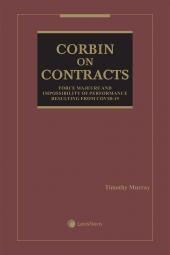Corbin on Contracts Desk Edition
Select a format
 International Order Inquiry
International Order Inquiry
Select subscription type
Terms & conditions
Subscribers receive the product(s) listed on the Order Form and any Updates made available during the annual subscription period. Shipping and handling fees are not included in the annual price.
Subscribers are advised of the number of Updates that were made to the particular publication the prior year. The number of Updates may vary due to developments in the law and other publishing issues, but subscribers may use this as a rough estimate of future shipments. Subscribers may call Customer Support at 800-833-9844 for additional information.
Subscribers may cancel this subscription by: calling Customer Support at 800-833-9844; emailing customer.support@lexisnexis.com; or returning the invoice marked "CANCEL".
If subscribers cancel within 30 days after the product is ordered or received and return the product at their expense, then they will receive a full credit of the price for the annual subscription.
If subscribers cancel between 31 and 60 days after the invoice date and return the product at their expense, then they will receive a 5/6th credit of the price for the annual subscription. No credit will be given for cancellations more than 60 days after the invoice date. To receive any credit, subscriber must return all product(s) shipped during the year at their expense within the applicable cancellation period listed above.
The total price includes the product(s) listed in the Order Form and any Updates for a limited period (minimum period of 30 days) after the order is placed ("Order Window"). Shipping and handling fees are not included in the grand total price.
All shipments may be returned, at subscribers' expense, for full credit of the Price within 30 days of receipt.
Shipments may not be returned, and no credits will be issued, more than 30 days after receipt.
After the Order Window, subscribers will receive notice of Updates along with the then-current grand total price and order process as Updates become available. Subscribers will only be shipped those Updates they specifically request.
Product description
View a sample of this title using the ReadNow feature
The 2023 Desk Edition provides an up-to-date exploration of the latest developments in contract law based on continuous review of the latest judicial decisions since the last revision. The 2023 Edition:
• Elucidates the evolving law of arbitration agreements, including the determination of when arbitrability is decided by the arbitrator as opposed to the court, as well as the Supreme Court’s recent guidance on the waiver of the right to arbitrate.
• Spotlights recent caselaw dealing with the enforceability of online agreements that hyperlink to terms of use.
• Highlights decisions holding that market downturns do not excuse the promisor’s obligations based on impossibility and similar theories.
• Explores cases that deal with construing preliminary agreements as contracts binding on the parties’ ultimate contractual objective.
• Discusses cases dealing with the difference between goods and services and the difference between the U.C.C. and the CISG.
• Shines a spotlight on recent caselaw dealing with the duty to negotiate in good faith; allowing recovery for unjust enrichment when the conduct at issue is governed by a contract; attempts to bind a party to a contract based on that party’s silence; and the infamous “battle of the forms.”
Corbin on Contracts is one of the most cited and influential treatises in print. The Corbin on Contracts Desk Edition provides a single-volume compendium of contract law, giving effective, efficient, accurate, and current analysis of all the tenets of the law of contracts. It is not merely an abridged version of the sixteen-volume landmark work.
Although it is a product complete unto itself, through the use of numerous practice resource references incorporated into every chapter, the Desk Edition provides the user with immediate reference to the multitude of case law citations, statutes, and other relevant material found in the full sixteen-volume Corbin treatise. In short, the user of the Desk Edition is provided with both a single-volume explanation of contract law and also with a vehicle that offers the option of doing deeper research by providing particular, continuous, and accurate references to the master treatise.
The 2021 edition ISBN is 9781663325389.
eBooks, CDs, downloadable content, and software purchases are noncancelable, nonrefundable and nonreturnable. Click here for more information about LexisNexis eBooks. The eBook versions of this title may feature links to Lexis+® for further legal research options. A valid subscription to Lexis+® is required to access this content.
Table of contents
Chapter 1, Preliminary Definitions
Chapter 2, Offers; Creation and Duration of Power of Acceptance
Chapter 3, Acceptance and Rejection of Offers
Chapter 4, Indefiniteness and Mistake in Expression
Chapter 5, Consideration
Chapter 6, Consideration-Mutuality of Obligation-Requirement and Output
Contracts-Effect of Option
Chapter 7, Consideration-Effect Of Pre-Existing Duty
Chapter 8, Reliance on a Promise as a Ground for Enforcement: The Doctrine of Promissory Estoppel
Chapter 9, Past Consideration and Moral Obligation
Chapter 10, Contracts Under Seal, Recognizances, Negotiable Instruments and Documents, and Letters of Credit
Chapter 11, Option Contracts and Rights of First Refusal
Chapter 12, History and Legal Operation of the Statute
Chapter 13, Statute of Frauds-Oral Variation or Rescission-Contracts Partly Within
Chapter 14, Manner of Raising Defenses-Restitution And Reformation
Chapter 15, Statute of Frauds-Debts of Another-Suretyship and Guaranty
Chapter 16, Debts of Another-Leading Object Rule-Indemnity Contracts
Chapter 17, Statute of Frauds-Interests In Land
Chapter 18, Interests in Land-Effect of Part Performance of Oral Contract
Chapter 19, Statute of Frauds-Contracts Not Performable Within One Year
Chapter 20, Statute of Frauds-Contracts in Consideration of Marriage
Chapter 21, Statute of Frauds-Contracts for the Sale of Goods
Chapter 22, Substance of the Memorandum: Its Nature and Contents
Chapter 23, Formal Requirements-Writing-Record-Signature-Oral Evidence
Chapter 24, Interpretation of Contracts
Chapter 25, Interpretation–The Process Called Implication
Chapter 26, The "Parol Evidence Rule"
Chapter 27, Capacity of Parties
Chapter 28, Avoidance or Reformation for Misconduct or Mistake
Chapter 29, Unconscionability and the Duty to Read
Chapter 30, Conditions of Legal Duty
Chapter 31, Express Conditions and Promises
Chapter 32, Constructive Conditions -Failure to Perform the Agreed Exchange
Chapter 33, Constructive Conditions In Sale of Goods
Chapter 34, Constructive Conditions In Service Contracts, Charter Parties, and Leases
Chapter 35, Condition In Installment Contracts-Divisibility
Chapter 36, Substantial Performance, Its Character and Effect
Chapter 37, Condition of Performance on Time -Condition of Notice
Chapter 38, Aleatory Contracts-No Agreed Exchange of Performances
Chapter 39, Condition Subsequent-Analysis-Pleading and Burden of Proof
Chapter 40, Elimination of Conditions by Waiver or Prevention
Chapter 41, Preliminary Analysis-Issues and Terminology
Chapter 42, Third Party Beneficiary History
Chapter 43, Third Party Beneficiary Statutes
Chapter 44, Intent to Benefit-Restatements-Interpretation
Chapter 45, Beneficiaries of Specific Types of Contracts
Chapter 46, Remedies, Powers and Defenses-Beneficiary, Promisee, and Promisor
Chapter 47, Preliminary Analysis-Concepts, Terminology, Source of Law
Chapter 48, Gift Assignments
Chapter 49, Assignability and Delegability-Freedom and Its Limitations
Chapter 50, Conditional and Future Rights, and After-Acquired Property
Chapter 51, Legal Effect s of Assignment-Defenses and Priorities
Chapter 52, Joint and Several Contracts
Chapter 53, Varieties of Breaches of Contracts-Total and Partial Breaches
Chapter 54, Breach of Contract by Anticipatory Repudiation
Chapter 55, Purpose and Extent of Damages-Causation, Compensation, Value
Chapter 56, Forseeability-Anticipated Profits-Degrees of Uncertainty
Chapter 57, Alternative Measures-Expenditures-Avoidable Consequences-Interest-Anticipatory Repudiation
Chapter 58, Liquidated Damages and Penalties
Chapter 59, Damages for Mental Suffering-Punitive Damages-Lending Money-Alternative Contracts Contracts for the Benefit of a Third Person
Chapter 60 ,Building Contracts-Employment-Sales of Land-Sales of Goods
Chapter 61, Common Law and Equity-General Requirements for Obtaining Restitution
Chapter 62, Restitution in Favor of a Plaintiff in Default
Chapter 63, Adequacy of Other Remedies
Chapter 64, Special Reasons for Denying Specific Enforcement
Chapter 65, Mutuality of Remedy-Negative Contracts-Liquidated Damages
Chapter 66, Election of Remedies
Chapter 67, Performance-Tender-Rescission-Release-Gift-Surrender-Cancellation-Contract Not To Sue
Chapter 68 Discharge by Nonperformance of Condition-Breach-Failure of Consideration-Prevention-Power Reserved-Condition Subsequent
Chapter 69, The Legal Operation of an Executory Accord
Chapter 70, Accord and Satisfaction
Chapter 71, Substituted Contract and Novation
Chapter 72, Account Stated
Chapter 73, Specialties-Alteration-Judgment-Award-Claim Preclusion
Chapter 74, Impossibility of Performance-Personal Inability
Chapter 75, Death or Destruction of Specific Things-Prorating Supply
Chapter 76, Legal Prohibition-Government Prohibition and Exigencies of War
Chapter 77, Discharge By Frustration of Purpose
Chapter 78, Impossibility of Performance of a Condition; Restitution in Cases of Impossibility
Chapter 79, Introduction to Contracts Contrary To Public Policy
Chapter 80, Contracts In Restraint Of Competition
Chapter 81, Contracts Involving Familial Relationships
Chapter 82, Sunday Contracts
Chapter 83, Bargains Harmful to the Administration of Justice
Chapter 84, Bargains Harmful to Public or Performance of Fiduciary Duty
Chapter 85, Bargains To Defraud Or Otherwise Injure Third Persons
Chapter 86, Wagering Bargains
Chapter 87, Usury Bargains
Chapter 88, Miscellaneous Bargains Contrary to Public Policy
Chapter 89, Effects of Being Contrary to Public Policy
 Lexis Nexis
Lexis Nexis 


